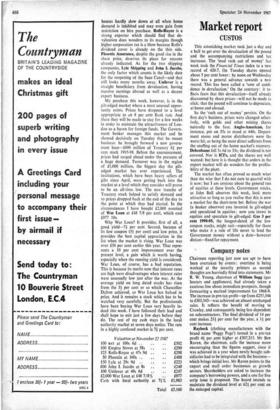Market report
CUSTOS
This astonishing market took just a day and a half to get over the devaluation of the pound and the accompanying restrictions and tax increases. The 'mad rush out of money' last week took the Financial Times index to a new record of 420.7. On Tuesday shares opened about 5 per cent lower: by noon on Wednesday there was a general advance towards a new record. This has been called a 'vote of confi- dence in devaluation.' On the contrary : it re- flects fears that this devaluation—itself already discounted by share prices—will not be made to stick; that the pound will continue to depreciate, at home and abroad.
So the 'rush out of money' persists. On the first day's business, prices were changed select- ively, with golds and other mining shares naturally to the fore. Anglo-American, for instance, put on 35s to stand at 440s. Depart- ment stores and motor distributors were the worst hit, as being the most direct sufferers from the snuffing out of the home market's recovery. Debenhams fell 3s 6d to 33s; the dividend is not covered. Nor is ICI's, and the shares are well wanted; but here it is thought that orders in the export market will do wonders for the profita- bility of the plant.
The market has often proved so much wiser than the wise that I do not care to quarrel with it now; but I am anxious about the general run of equities at these levels. Government stocks, as John Bull observes this week, look more attractive so long as you realise that this is now a market for the short-term bet. Before the war (a broker observes) you invested in gilt-edged and speculated in equities: now you invest in equities and speculate in gilt-edged. Gas 3 per cent 1990-95, the longest-dated of the low coupon stocks, might suit—especially for those who make it a rule of life never to lend the Government money without a date—however distant—fixed for repayment.
Company notes
Chairmen reporting just now are apt to have been overtaken by events: overtime is being worked at the security printers as second thoughts are hurriedly fitted into statements. Mr R. W. Young, chairman of William Sugg (gas heaters and appliances), had already taken a cautious line about immediate prospects, though forecasting a marked improvement for 1968-9. The increase in pre-tax profit—up from £257,546 to £303,343—was achieved on almost unchanged sales. It reflects the benefit of moving to Crawley, and consequently being less dependent on subcontractors. The final dividend of 14 per cent makes 211 per cent for the year, a 14 per cent increase.
Raybeck (clothing manufacturers with the brand name 'Peggy Page') turned in a pre-tax profit 44 per cent higher at £307,315. Mr Ben Raven, the chairman, calls the increase more encouraging than the figures suggest, since it was achieved in a year when newly bought sub- sidiaries had to be integrated with the business— which brings initial loss. Mr Raven points to the export and mail order businesses as growth sectors. Shareholders are asked to increase the company's borrowing powers, and a one for five scrip issue is proposed. The board intends to maintain the dividend level at 621 per cent on the enlarged capital.














































 Previous page
Previous page